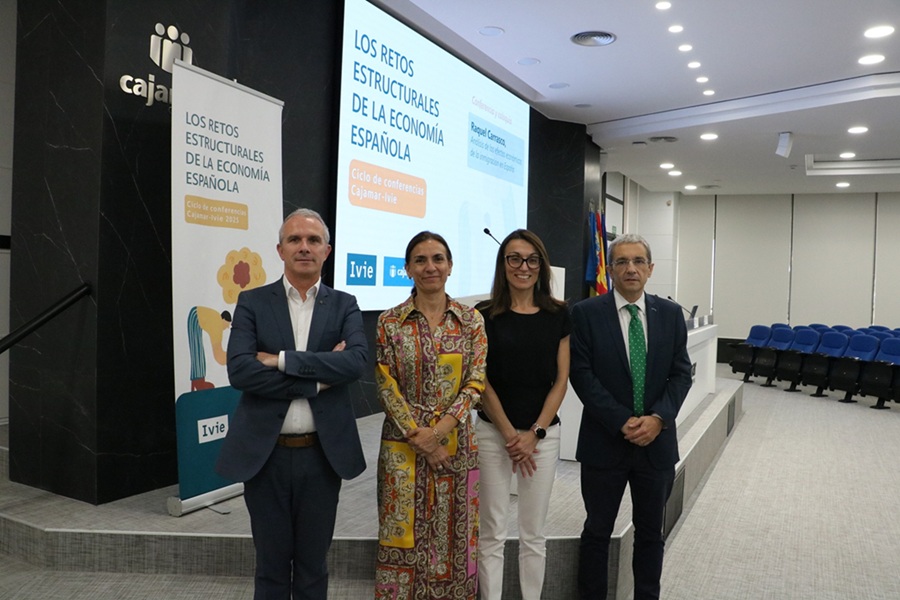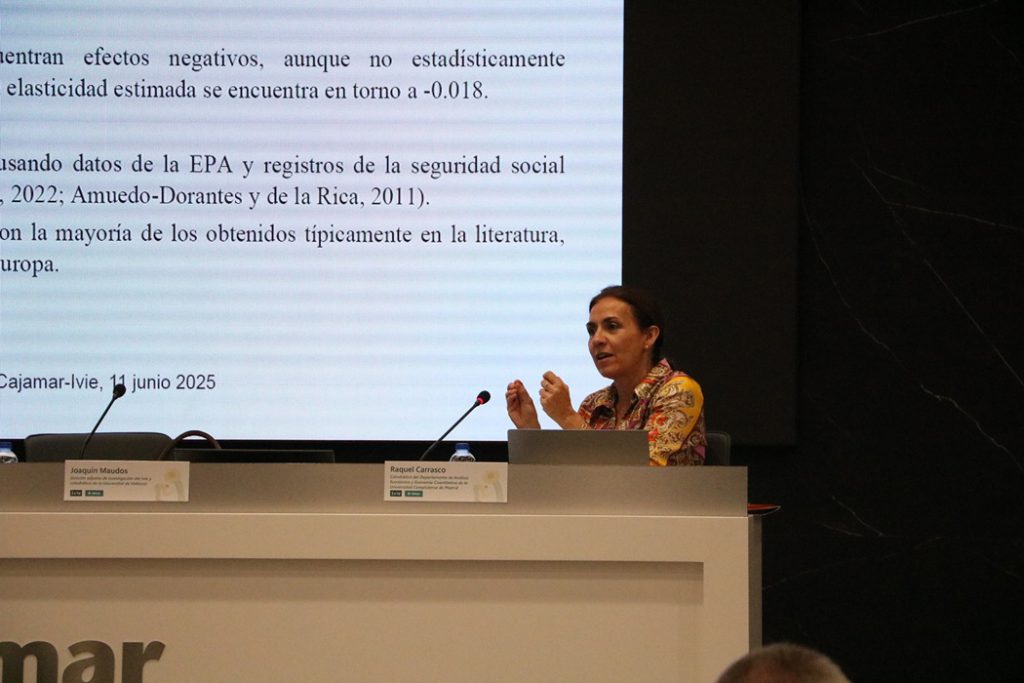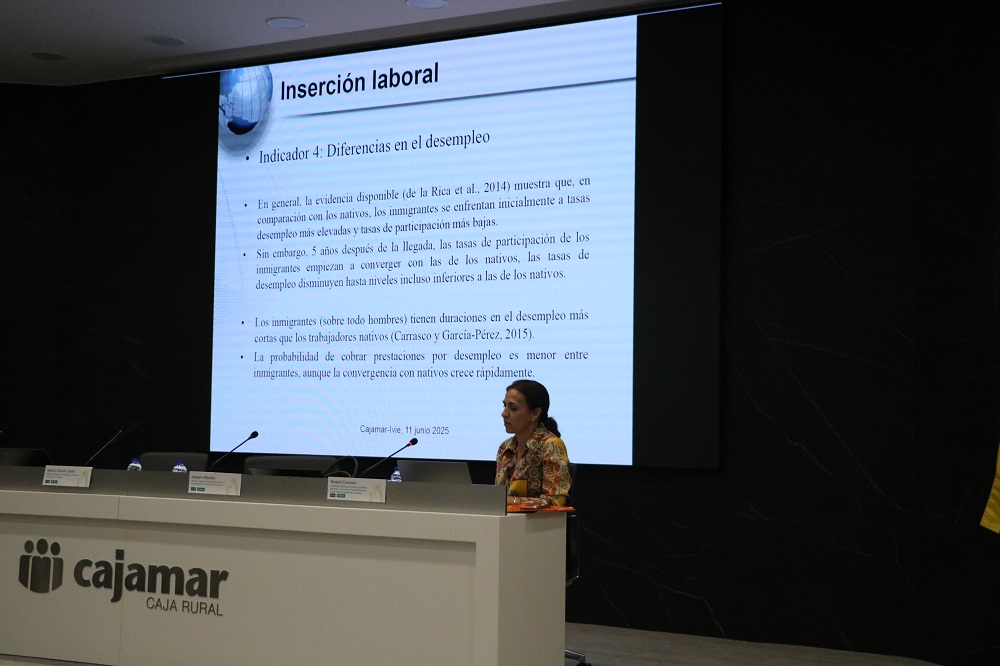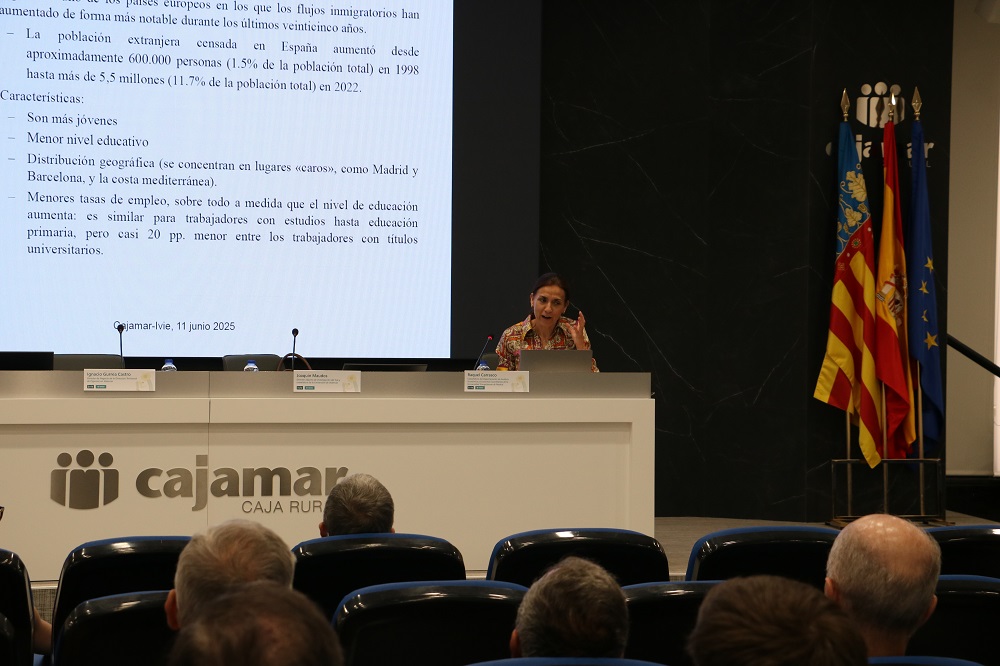Esta web utiliza cookies para que podamos ofrecerte la mejor experiencia de usuario posible. La información de las cookies se almacena en tu navegador y realiza funciones tales como reconocerte cuando vuelves a nuestra web o ayudar a nuestro equipo a comprender qué secciones de la web encuentras más interesantes y útiles.

Raquel Carrasco Challenges Misconceptions About Immigration and the Economy at the 6th Cajamar and Ivie Conference
The Professor at the Complutense University of Madrid attributes the negative perception of immigration reflected in CIS (Sociological Research Center) surveys to misinformation
Raquel Carrasco, Professor at the Complutense University of Madrid, emphasized that empirical evidence contradicts the belief that immigration harms the Spanish society or the economy. The economist gave the sixth and final lecture in the series “Los retos estructurales de la economía española de 2025”, organized by Cajamar and the Ivie in Valencia. In her address, Carrasco called for an end to alarmist narratives: “Immigration is not a threat, but a necessary and unstoppable process.” She highlighted the “clear and positive”contribution of the immigrant population to economic growth and sustainability of the public system.
Despite public perception, which ranked immigration as the top concern among Spaniards in September 2024 (now sixth, according to the CIS), the data shows no negative impact on employment or wages for native Spaniards. “There is no empirical evidence that immigrants take jobs from natives or depress their wages,” Carrasco stated. She argued that existing prejudices stem from misinformation among citizens.
Carrasco presented data from the Bank of Spain confirming that the foreign population contributed between 0.4 and 0.7 percentage points to GDP per capita growth between 2022 and 2024, which stood at 2.9%.
In the labor market, the initial employment rate gap between immigrants and natives is 15% (4% for women), but this narrows over time, particularly among Latin American immigrants. However, challenges persistent in employment quality: although employment rates converge, immigrants continue to hold lower-quality jobs. The situation is especially difficult for immigrants from North Africa, whose labor integration is slower.
Regarding wages, immigrants earn on average 30% less than natives. However, 94% of this gap can be explained by demographic and educational differences, and it tends to diminish over time. “There is no evidence of wage discrimination when comparing individuals with equivalent profiles”, she said. “However, in some sectors, the arrival of immigrants with lower reservation wages may increase companies’ bargaining power, allowing them to offer lower wages supported by a ‘cheaper’ migrant workforce”, she added.
Carrasco also cautioned against interpreting crime statistics. Although conviction rates are twice as high among immigrants, this difference disappears when comparing groups that are homogeneous in terms of age, gender, and skill level. “It is not a question of nationality, but of demographic composition”, she explained.
On housing, she noted that immigration accounted for 2% of the increase in housing prices between 2000 and 2010, but it also drove nearly half of the increase in residential construction. In terms of public services, such as healthcare, immigrants use the National Health System as similar rates to natives within the same age groups. However, because the immigrant population tends to be younger overall, they make less use of health services. “Immigrants contribute more in taxes and Social Security payments than governments spend on their social protection, health, and education,” she explained. In addition, Carrasco recalled a warning from AIReF, which calculated that Spain needs one million immigrants per year to sustain its pension system.
In her closing remarks, she insisted that we must fight against a zero-sum mindset of “its either them or us”, calling it completely misguided. She urged efforts to focus on explaining the real effects of immigration. She also advocated for a commitment to legal immigration, recruitment in countries of origin, and better integration management. “It’s not about how many we regularize, but about recognizing that we need them, we want them here, and we want them to be legal,” she concluded.
The 2025 edition of the conference series promoted by Cajamar and Ivie in Valencia concluded with a speech by Raquel Carrasco. The audience was invited to attend a new series scheduled for next year. Ignacio Gurrea, Business Director of Cajamar’s Regional Office in Valencia, and Joaquín Maudos, Ivie Research Deputy Director and Professor at the University of Valencia, officially closed the series, which included six in-person conferences that were held between February and June 2025.





